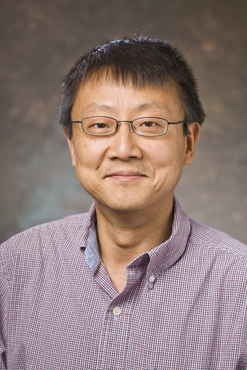Projects include tobacco control in primary care and oncology patients, and increasing HPV vaccination in childhood cancer survivors.
The Cancer Prevention & Research Institute of Texas (CPRIT) on Aug. 24 awarded more than $2.7 million to fund four projects at UT Health San Antonio.
A $1.3 million grant will enhance tobacco screening and treatment for two groups of patients—those who receive their primary care through the UT Health Physicians medical practice and those who receive their oncology care through the UT Health San Antonio MD Anderson Cancer Center.
“In addition to providing tobacco cessation services to thousands of patients in these two settings, we will establish a model for innovation in tobacco control delivery that can be readily adopted by other provider systems across Texas,” said Amelie G. Ramirez, Dr.P.H., professor of epidemiology and biostatistics and director of the Institute for Health Promotion Research at UT Health San Antonio.
During patient visits, provider teams will prompt and guide patients who use tobacco to enroll via their smartphones in SMS text messaging or social media messaging (Facebook Messenger) services designed specifically for the patient populations of these practices.
“These cessation services, based on the research team’s successful Quitxt text messaging service to quit smoking, will provide messaging designed to increase readiness for patients who are not ready quit promptly, and to assist cessation for those who are ready to quit,” Dr. Ramirez said.
Preventing HPV-related cancers in pediatric survivors
Human papillomavirus (HPV) contributes to more than 30,000 new cancers in the U.S. every year, yet only 43 percent of young females and 32 percent of young males are being vaccinated. A $1 million, three-year CPRIT grant awarded to UT Health San Antonio pediatric oncologist Allison Grimes, M.D., will remedy this in a fragile group of children.
“Childhood cancer survivors represent a particularly high-risk population,” Dr. Grimes said. “Compared to the U.S. general population, pediatric cancer survivors experience significantly higher rates of HPV-related malignancies—40 percent more in females and 150 percent more in males. Despite these increased risks, young survivors have very low HPV vaccination rates. Our project will address this issue across a wide area of the state.”
In South Texas, the majority of children with cancer receive their treatment as part of the South Texas Pediatric Minority Underserved NCI (National Cancer Institute) Community Oncology Research Program. This network operates as a consortium of five regional pediatric institutions: UT Health San Antonio (with clinical partner University Hospital), Methodist Children’s Hospital in San Antonio, Dell Children’s Hospital in Austin, Driscoll Children’s Hospital in Corpus Christi and the Texas Tech University Health Sciences Center in El Paso.
The catchment area for this network encompasses 113 counties and has a population approaching 10 million. “Our overall project goal is to increase HPV vaccination rates among childhood cancer survivors in this network,” said Dr. Grimes, assistant professor of pediatrics and investigator with the Greehey Children’s Cancer Research Institute at UT Health San Antonio.
Innovative bench research awards
A $200,000 CPRIT award will support research by Edward P. Hasty, D.V.M., professor of molecular medicine at UT Health San Antonio. The BCR-ABL protein, which is generated from the improper fusion of two genes, has unregulated activity that can increase genomic mutations and the risk of cancers including leukemia.
Dr. Hasty will use a new class of drugs developed in his laboratory to fight resistance that arises to drugs that treat cancers expressing BCR-ABL.
CPRIT also awarded $200,000 to a separate UT Health San Antonio research project that targets this protein. Hai Rao, Ph.D., associate professor of molecular medicine, seeks to develop small molecules that would rapidly destroy BCR-ABL.
“The study would lead to new anti-BCR-ABL drugs for patients with chronic myelogenous leukemia (CML) and acute lymphocytic leukemia (ALL) patients,” Dr. Rao said.
Recent successes

Three months ago, on May 17, 2018, CPRIT announced a $6 million grant to support UT Health San Antonio’s recruitment of a top DNA repair scientist. Internationally known biochemist Patrick Sung, D.Phil., is joining UT Health from Yale University.
Dr. Sung’s discoveries have increased understanding of how DNA can repair damage induced by radiation, carcinogens and other causes. Cancer cells are particularly effective at repairing their DNA, which makes them harder to kill. Hindering this capability is a major target for development of anticancer therapies.
On Feb. 26, 2018, CPRIT announced a $899,547 grant to David Morilak, Ph.D., Department of Pharmacology at UT Health San Antonio. The funds will be used to study mechanisms and new treatments for cognitive impairment associated with a type of hormone treatment used in men with prostate cancer.
This study will be part of the dissertation project of graduate student Allie Sharp in Dr. Morilak’s lab. Sharp is a graduate of the Voelcker Biomedical Research Academy, an intensive, two-year research program for San Antonio-area high school students. The Voelcker Academy is funded by the Max and Minnie Tomerlin Voelcker Fund and is offered at UT Health San Antonio.
Dr. Amelie Ramirez and Dr. Hai Rao are multiple CPRIT grant recipients. On Aug. 16, 2017, CPRIT announced a $1.3 million award to Dr. Ramirez to expand the Quitxt stop-smoking service with a new social media support component. That same day, CPRIT announced a $200,000 award to enable Dr. Rao to study a novel chemical strategy to treat lung cancer and potentially many other cancer types.
In May 2016, the Greehey Children’s Cancer Research Institute at UT Health garnered $10.9 million from CPRIT—a larger amount than any other academic institution in the state for that cycle. The funding included $5 million to develop animal models for testing novel therapies in children and $3.6 million to establish a Cancer Genome Sequencing and Computational Core at the Greehey Institute.
In November 2016, CPRIT awarded an additional $5.8 million for research and training programs at UT Health San Antonio.
The University of Texas Health Science Center at San Antonio, now called UT Health San Antonio®, is one of the country’s leading health sciences universities. With missions of teaching, research, healing and community engagement, its schools of medicine, nursing, dentistry, health professions and graduate biomedical sciences have produced 35,850 alumni who are leading change, advancing their fields and renewing hope for patients and their families throughout South Texas and the world. To learn about the many ways “We make lives better®,” visit www.uthscsa.edu.


